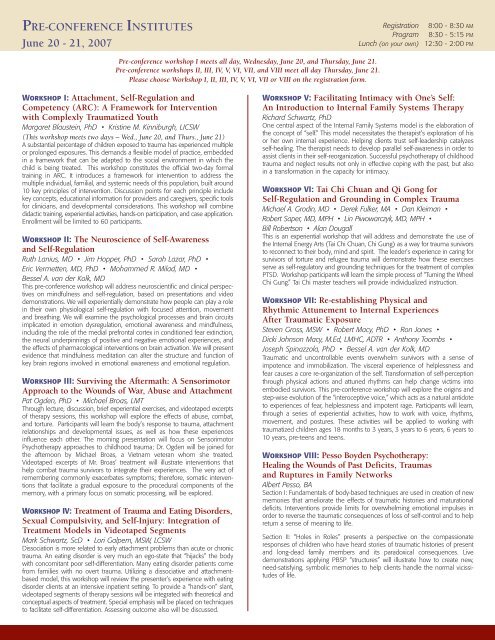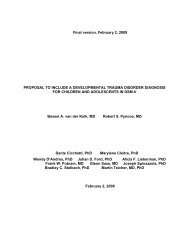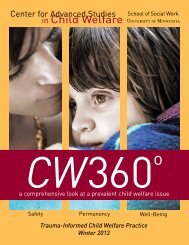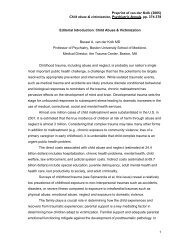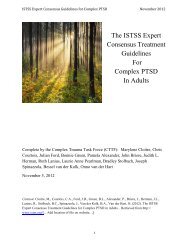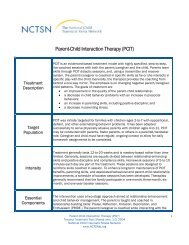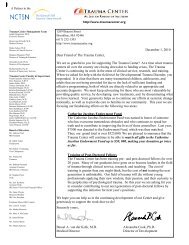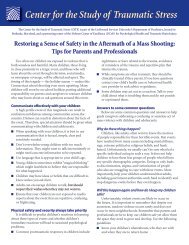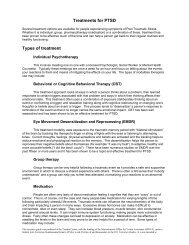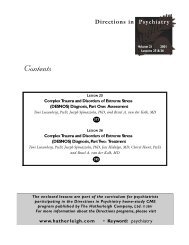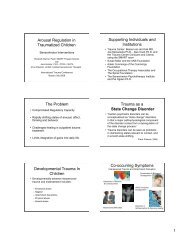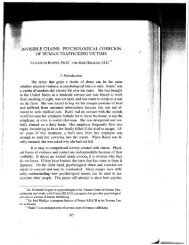10011_Meadows_TraumaConf_2007.qxd:Layout 1 - The Trauma ...
10011_Meadows_TraumaConf_2007.qxd:Layout 1 - The Trauma ...
10011_Meadows_TraumaConf_2007.qxd:Layout 1 - The Trauma ...
Create successful ePaper yourself
Turn your PDF publications into a flip-book with our unique Google optimized e-Paper software.
PRE-CONFERENCE INSTITUTESJune 20 - 21, 2007RegistrationProgramLunch (on your own)8:00 - 8:30 AM8:30 - 5:15 PM12:30 - 2:00 PMPre-conference workshop I meets all day, Wednesday, June 20, and Thursday, June 21.Pre-conference workshops II, III, IV, V, VI, VII, and VIII meet all day Thursday, June 21.Please choose Workshop I, II, III, IV, V, VI, VII or VIII on the registration form.WORKSHOP I: Attachment, Self-Regulation andCompetency (ARC): A Framework for Interventionwith Complexly <strong>Trauma</strong>tized YouthMargaret Blaustein, PhD • Kristine M. Kinniburgh, LICSW(This workshop meets two days – Wed., June 20, and Thurs., June 21)A substantial percentage of children exposed to trauma has experienced multipleor prolonged exposures. This demands a flexible model of practice, embeddedin a framework that can be adapted to the social environment in which thechild is being treated. This workshop constitutes the official two-day formaltraining in ARC. It introduces a framework for intervention to address themultiple individual, familial, and systemic needs of this population, built around10 key principles of intervention. Discussion points for each principle includekey concepts, educational information for providers and caregivers, specific toolsfor clinicians, and developmental considerations. This workshop will combinedidactic training, experiential activities, hands-on participation, and case application.Enrollment will be limited to 60 participants.WORKSHOP II: <strong>The</strong> Neuroscience of Self-Awarenessand Self-RegulationRuth Lanius, MD • Jim Hopper, PhD • Sarah Lazar, PhD •Eric Vermetten, MD, PhD • Mohammed R. Milad, MD •Bessel A. van der Kolk, MDThis pre-conference workshop will address neuroscientific and clinical perspectiveson mindfulness and self-regulation, based on presentations and videodemonstrations. We will experientially demonstrate how people can play a rolein their own physiological self-regulation with focused attention, movementand breathing. We will examine the psychological processes and brain circuitsimplicated in emotion dysregulation, emotional awareness and mindfulness,including the role of the medial prefrontal cortex in conditioned fear extinction,the neural underpinnings of positive and negative emotional experiences, andthe effects of pharmacological interventions on brain activation. We will presentevidence that mindfulness meditation can alter the structure and function ofkey brain regions involved in emotional awareness and emotional regulation.WORKSHOP III: Surviving the Aftermath: A SensorimotorApproach to the Wounds of War, Abuse and AttachmentPat Ogden, PhD • Michael Broas, LMTThrough lecture, discussion, brief experiential exercises, and videotaped excerptsof therapy sessions, this workshop will explore the effects of abuse, combat,and torture. Participants will learn the body’s response to trauma, attachmentrelationships and developmental issues, as well as how these experiencesinfluence each other. <strong>The</strong> morning presentation will focus on SensorimotorPsychotherapy approaches to childhood trauma; Dr. Ogden will be joined forthe afternoon by Michael Broas, a Vietnam veteran whom she treated.Videotaped excerpts of Mr. Broas’ treatment will illustrate interventions thathelp combat trauma survivors to integrate their experiences. <strong>The</strong> very act ofremembering commonly exacerbates symptoms; therefore, somatic interventionsthat facilitate a gradual exposure to the procedural components of thememory, with a primary focus on somatic processing, will be explored.WORKSHOP IV: Treatment of <strong>Trauma</strong> and Eating Disorders,Sexual Compulsivity, and Self-Injury: Integration ofTreatment Models in Videotaped SegmentsMark Schwartz, ScD • Lori Galpern, MSW, LCSWDissociation is more related to early attachment problems than acute or chronictrauma. An eating disorder is very much an ego-state that “hijacks” the bodywith concomitant poor self-differentiation. Many eating disorder patients comefrom families with no overt trauma. Utilizing a dissociative and attachmentbasedmodel, this workshop will review the presenter’s experience with eatingdisorder clients at an intensive inpatient setting. To provide a “hands-on” slant,videotaped segments of therapy sessions will be integrated with theoretical andconceptual aspects of treatment. Special emphasis will be placed on techniquesto facilitate self-differentiation. Assessing outcome also will be discussed.WORKSHOP V: Facilitating Intimacy with One’s Self:An Introduction to Internal Family Systems <strong>The</strong>rapyRichard Schwartz, PhDOne central aspect of the Internal Family Systems model is the elaboration ofthe concept of “self.” This model necessitates the therapist’s exploration of hisor her own internal experience. Helping clients trust self-leadership catalyzesself-healing. <strong>The</strong> therapist needs to develop parallel self-awareness in order toassist clients in their self-reorganization. Successful psychotherapy of childhoodtrauma and neglect results not only in effective coping with the past, but alsoin a transformation in the capacity for intimacy.WORKSHOP VI: Tai Chi Chuan and Qi Gong forSelf-Regulation and Grounding in Complex <strong>Trauma</strong>Michael A. Grodin, MD • Derek Fulker, MA • Dan Kleiman •Robert Saper, MD, MPH • Lin Piwowarczyk, MD, MPH •Bill Robertson • Alan DougallThis is an experiential workshop that will address and demonstrate the use ofthe Internal Energy Arts (Tai Chi Chuan, Chi Gung) as a way for trauma survivorsto reconnect to their body, mind and spirit. <strong>The</strong> leader’s experience in caring forsurvivors of torture and refugee trauma will demonstrate how these exercisesserve as self-regulatory and grounding techniques for the treatment of complexPTSD. Workshop participants will learn the simple process of “Turning the WheelChi Gung.” Tai Chi master teachers will provide individualized instruction.WORKSHOP VII: Re-establishing Physical andRhythmic Attunement to Internal ExperiencesAfter <strong>Trauma</strong>tic ExposureSteven Gross, MSW • Robert Macy, PhD • Ron Jones •Dicki Johnson Macy, M.Ed, LMHC, ADTR • Anthony Toombs •Joseph Spinazzola, PhD • Bessel A. van der Kolk, MD<strong>Trauma</strong>tic and uncontrollable events overwhelm survivors with a sense ofimpotence and immobilization. <strong>The</strong> visceral experience of helplessness andfear causes a core re-organization of the self. Transformation of self-perceptionthrough physical actions and attuned rhythms can help change victims intoembodied survivors. This pre-conference workshop will explore the origins andstep-wise evolution of the “interoceptive voice,” which acts as a natural antidoteto experiences of fear, helplessness and impotent rage. Participants will learn,through a series of experiential activities, how to work with voice, rhythms,movement, and postures. <strong>The</strong>se activities will be applied to working withtraumatized children ages 18 months to 3 years, 3 years to 6 years, 6 years to10 years, pre-teens and teens.WORKSHOP VIII: Pesso Boyden Psychotherapy:Healing the Wounds of Past Deficits, <strong>Trauma</strong>sand Ruptures in Family NetworksAlbert Pesso, BASection I: Fundamentals of body-based techniques are used in creation of newmemories that ameliorate the effects of traumatic histories and maturationaldeficits. Interventions provide limits for overwhelming emotional impulses inorder to reverse the traumatic consequences of loss of self-control and to helpreturn a sense of meaning to life.Section II: “Holes in Roles” presents a perspective on the compassionateresponses of children who have heard stories of traumatic histories of presentand long-dead family members and its paradoxical consequences. Livedemonstrations applying PBSP “structures” will illustrate how to create new,need-satisfying, symbolic memories to help clients handle the normal vicissitudesof life.


